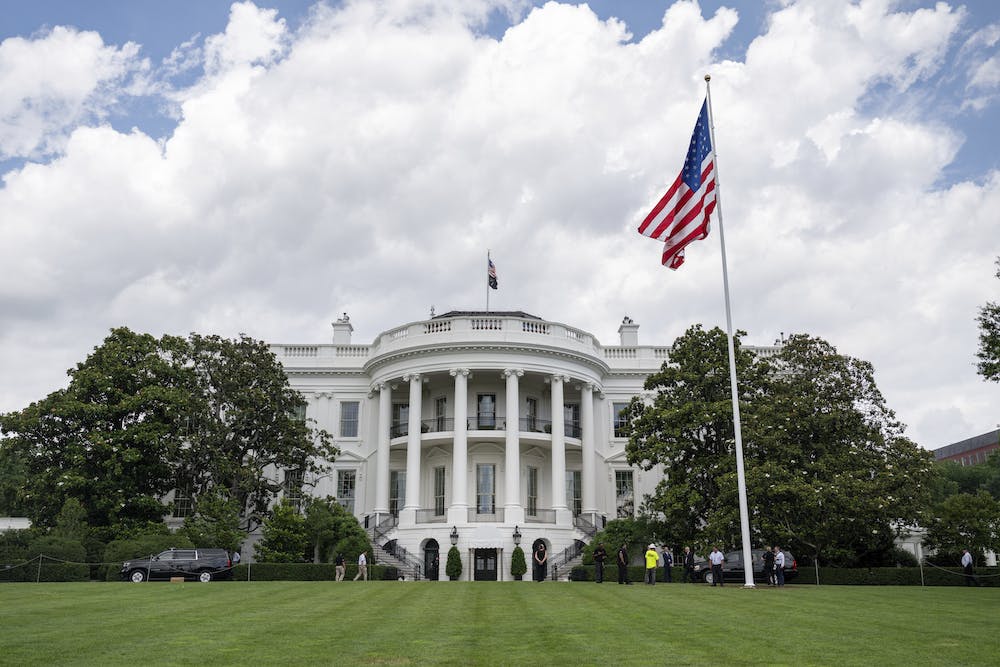AI in Top-Secret Clouds Is a ‘Game Changer’ for IC, DNI Says
Tulsi Gabbard touts significant improvements in AI, data analysis, interoperability and operational intelligence at the AWS Summit 2025.

The intelligence community is leveraging the combined power of artificial intelligence and cloud computing to enhance efficiency, speed and quality of intelligence operations, Director of National Intelligence Tulsi Gabbard said Tuesday during a keynote with Dave Levy, Amazon Web Services vice president of worldwide public sector, at the AWS Summit in Washington, D.C.
“Opening up, making it possible for us to use AI applications in the top-secret clouds, has been a game changer,” Gabbard said. “Looking across all of the IC elements, these are tools that are better helping us get after our mission.”
AI Enables IC to Operationalize Intelligence
Gabbard cited the accelerated declassification efforts for historical documents, including those related to the assassinations of President John F. Kennedy and Senator Robert F. Kennedy. What once took human analysts months or years of page-by-page review is now accomplished significantly faster through AI tools operating within these secure cloud platforms, she said. This not only speeds up transparency but also frees up valuable human expertise for more complex analytical tasks. This exponential improvement in processing capability, facilitated by the cloud’s vast storage and computational power, ensures that intelligence is operationalized more quickly, she said.
“Ten thousand hours of media content, for example, that normally would take eight people, 48 hours to comb through now takes one person one hour through the use of some of the AI tools that we have here,” Gabbard said.
Gabbard added that the integration of AI applications within secure, top-secret cloud environments has been a pivotal advancement to efficiency and interoperability. This capability allows the 18 intelligence agencies to securely process, analyze and store vast amounts of highly sensitive data, overcoming previous limitations in on-premise systems, Gabbard said. The cloud’s scalability and agility are crucial, enabling intelligence professionals to access robust computing resources on demand, a necessity for the computationally intensive nature of modern AI, she added.
“For us to be able to provide these efficiencies and these tools across the entire enterprise and to support those unique and specific tools for entities like NGA and NRO and the geo and space … is phenomenal,” said Gabbard. “Operationalizing intelligence so that we don’t collect intelligence just to have it, but to make sure it is applicable and usable and operational both for, for all of our customers.”
AWS Launches Secret-West Cloud Region
During the event, AWS announced its intention to launch one of these environments – AWS Secret-West, a second secret cloud region – this year. This new region will significantly expand cloud support for classified U.S. government missions, particularly at the secret classification level. According to Levy, the new region will enable defense and national security customers to deploy multi-region architectures, dramatically enhancing the resiliency and availability of their critical workloads.
“The launch of the AWS Secret-West Region will strengthen U.S. AI leadership and accelerate the development of advanced capabilities and groundbreaking innovation,” Levy said in a statement ahead of the summit.
Shifting Away from In-House Federal Tech Development
Gabbard also emphasized a strategic shift towards greater collaboration with the private sector. Recognizing that specialized technology — particularly in AI and cloud infrastructure — is often developed and refined outside government walls, Gabbard added that agencies are moving away from in-house federal tech development.
“I want to get us away from having the government trying to build tech solutions for itself,” said Gabbard. “It’s really not what the government is best at doing but really focusing on buying and purchasing solutions wherever we can, so that our workforce can really focus on the things that we are very good at and have exclusive responsibilities to fulfill.”
This is a carousel with manually rotating slides. Use Next and Previous buttons to navigate or jump to a slide with the slide dots
-

AI Foundations Driving Government Efficiency
Federal agencies are modernizing systems, managing risk and building trust to scale responsible AI and drive government efficiency.
40m watch -

Navy Memo Maps Tech Priorities for the Future Fight
Acting CTO’s memo outlines critical investment areas, from AI and quantum to cyber and space, as part of an accelerated modernization push.
5m read -

DOD Can No Longer Assume Superiority in Digital Warfare, Officials Warn
The DOD must make concerted efforts to address cyber vulnerabilities to maintain the tactical edge, military leaders said at HammerCon 2025.
4m read -

New NSF Program Cultivates the Future of NextG Networks
The agency’s new VINES program looks to tackle key challenges like energy efficiency and future-proofing wireless tech.
21m watch -

Marine Corps Operation StormBreaker Slashes Software Delivery Timelines by 17x
New program aims to deliver critical digital capabilities to warfighters at the "speed of relevance" by overhauling traditional processes.
4m read -

DHA CDAO Spearheads Master Data Catalog to Boost Transparency
Jesus Caban plans to boost DHA's data maturity through a new master data catalog, governance frameworks and inventory of tech tools.
5m read -

Trump Orders Spark Government-Wide Acquisition Overhaul
As Trump pushes for a faster, simpler procurement system, agencies are leveraging AI and adapting strategies to meet new requirements.
5m read -

Inside Oak Ridge National Lab’s Pioneer Approach to AI
Energy Department’s Oak Ridge National Lab transforms AI vulnerabilities into strategic opportunities for national defense.
22m listen -

A Look at Federal Zero Trust Transformation
Recent developments from CISA and DOD show how government is advancing zero trust quickly.
20m read -

Modernization Strategies to Enable Energy Innovation
Lawrence Berkeley National Lab and Maximus experts explore the modernization strategies driving digital transformation and operational resilience within the energy sector.
33m watch -

DOI Must Modernize Energy to Win AI Race, Secretary Says
Doug Burgum links AI innovation to energy reform as DOI advances digital infrastructure and wildfire response under Trump’s tech agenda.
2m read -

NIST to Release New AI Cybersecurity Guidance as Federal Use Expands
NIST plans to release AI cybersecurity guidance within the year to support safe adoption as federal agencies expand use cases.
4m read
















